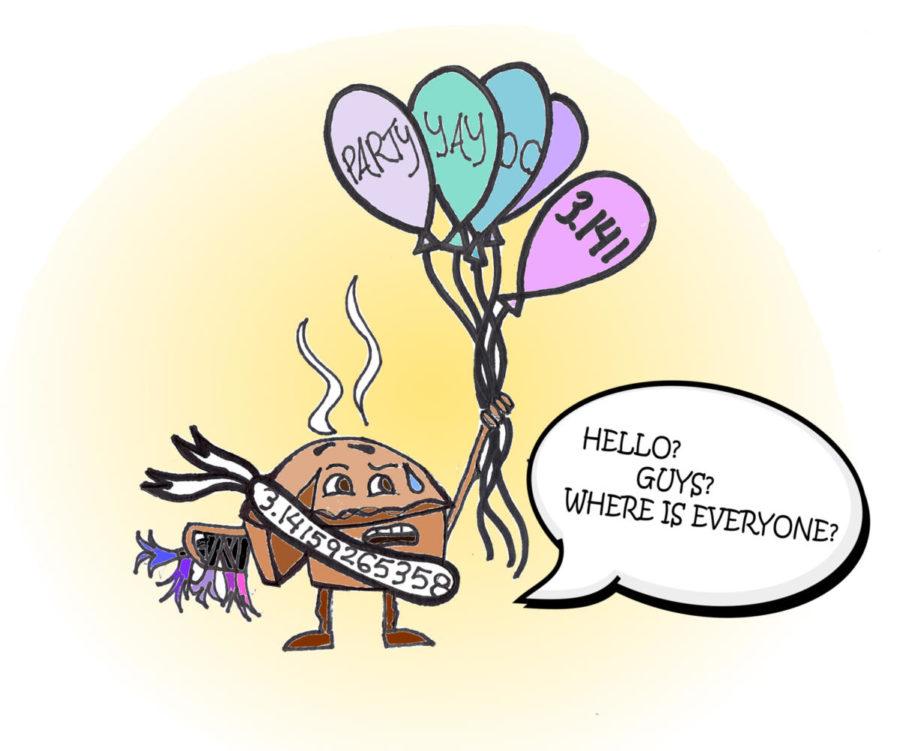It’s Pi Day, again. And no one cares, again — except some.
March 14, 2018
Growing up, every child has their favorite holiday.
Maybe it’s Halloween — dressing up in frightening costumes, parading around the neighborhood to collect bite-sized goodies from generous neighbors.
For many more, it’s Christmas, a day characterized by torn-apart, decorated wrapping paper and exciting gifts from Santa.
But some children just don’t care for the ordinary drollery of family time or gift-giving. Some children are just different.
To these kids, all this “festive” celebration pales in comparison to another holiday that often flies under the radar. So unless there’s a wrapped integral-shaped cookie-cutter sitting under the Christmas tree, they might spend the day hunched over a wrinkled piece of paper scribbled with hundreds of digits, preparing for a holiday a few short months away.
That’s right, these children are giving up their livelihoods to prepare for Pi Day — a holiday no one outside Mathnerdia seems to care about.
But why normal children aren’t interested in a holiday that includes obsessive number-crunching and sickening levels of pie consumption remains a mystery. Pi Day boasts enough fun activities and rich tradition to easily rival Thanksgiving and Christmas.
One of those traditions in particular stands alone as every math enthusiasts’ favorite — the infamous pi memorization contest.
Because pi is an irrational value — meaning its digits are infinite and never repeat — no one can possibly memorize every digit. But hopefully the winner can recite more than the first three — three, one and four — as doing so would only require knowing today’s date.
Schools remain the primary hotspots for these competitions. Teachers desperately try to rouse their students’ competitive spirits, with the fleeting hope that this magical number might attract more children to mathematics.
As the day of competition grows nearer, the tension between these students grows stronger — the promise of schoolwide acclaim for the winner is an opportunity too tantalizing to pass up. And when Pi Day finally arrives, other students and teachers see them shuffling nervously throughout the hallways, mouthing digits to themselves in a rhythmic pattern.
A hushed suspense falls over the class as the first competitor steps up to recite the digits they’ve poured their soul into memorizing.
At some schools, the winner may memorize as few as forty. At Harvard, that number reaches 224. And at VIT University in Vellore, India, one student rattled off as many as 70,000.
Whatever the number, the outcome is always the same. The winner receives pitiful applause from classmates, their great accomplishment sadly forgotten only seconds later.
Yet the applause merely signifies appreciation for wasting class time — the claps are mostly empty, just like the child’s dreams of one day fitting in with their peers.
“All I got was a mini pumpkin pie, after 300 hours spent memorizing pi,” one winner said. “And my teacher went right back to our algebra lesson 30 seconds later.”
“My classmates just clapped politely and unenthusiastically,” another middle-schooler said. “It’s almost like they were freaked out by my obsession with memorizing digits, and didn’t appreciate my mad skills at all.”
And they’re completely right — mathematical prowess seemingly has no place in pop culture. Math geeks are not celebrated celebrities. We don’t give them Kardashian-like reality television shows. Journalists don’t publish columns about them in popular newspapers.
“Loser!” a jock will sneer in the winner’s general direction — an insult representing torment from all of society.
At least on the outside, they manage to brush it off — these kinds of insults are common. But on the inside, these kids are torn apart — and deeply jealous that they couldn’t have the gift of being intellectually average.
But as difficult as life is for math nerds in school, it becomes infinitely more challenging in adulthood. As every business magazine tells us these days, a math degree is practical — too practical. At all the corporations they will later head, grown-up math nerds will stroll through the halls and receive jeers and taunts from old classmates, now job candidates whom they refused to hire. Being at the financial pinnacle of society is just so emotionally draining.
Despite seemingly endless bullying, they still have the same unwavering commitment to Pi Day that they always did. But instead of spending the day in numbers-induced hypertension at the school competition, these pi lovers sit alone in a corner of their office, shovelling fistfulls of pie into their mouths and sobbing through their fourth recitation session of the day.
Even as they pocket their six-figure salary on their way home, they stare off into space wistfully, hoping that one day, after decades of neglect, society might actually appreciate them.
And when that day comes, Pi Day may finally get the recognition it deserves — from all walks of life, not just math nerds.
Neena primarily writes about politics and local issues for The Pitt News. Write to Neena at nnh7@pitt.edu.



